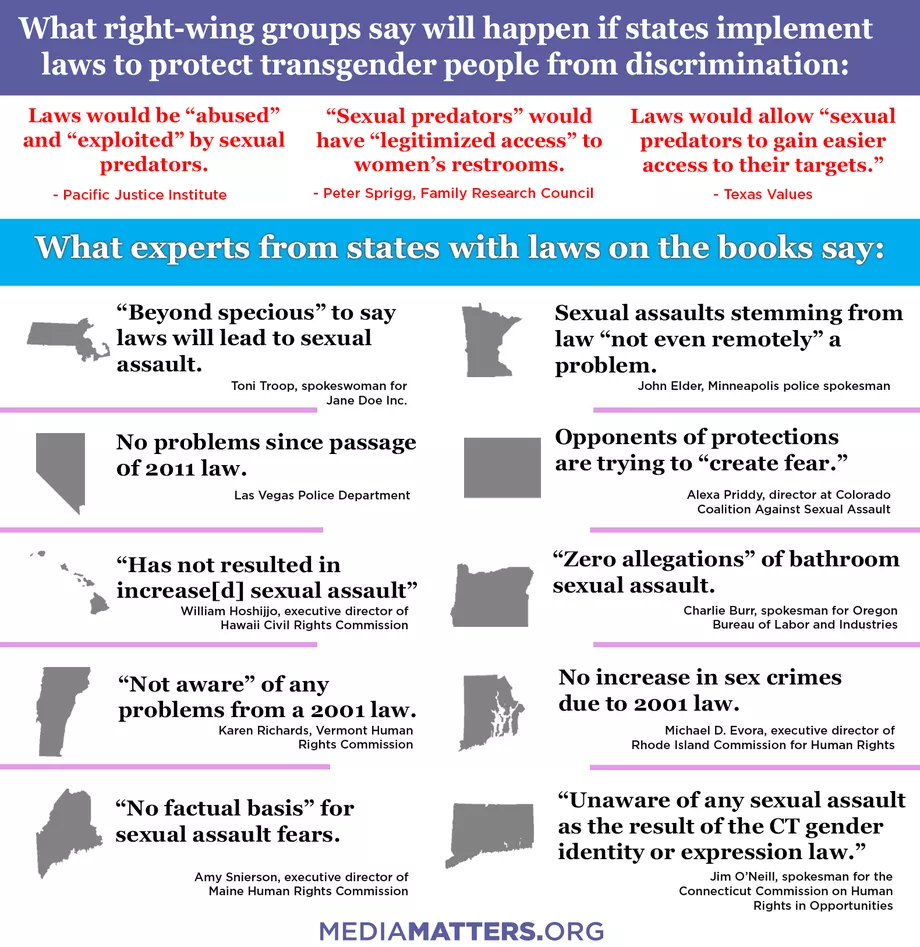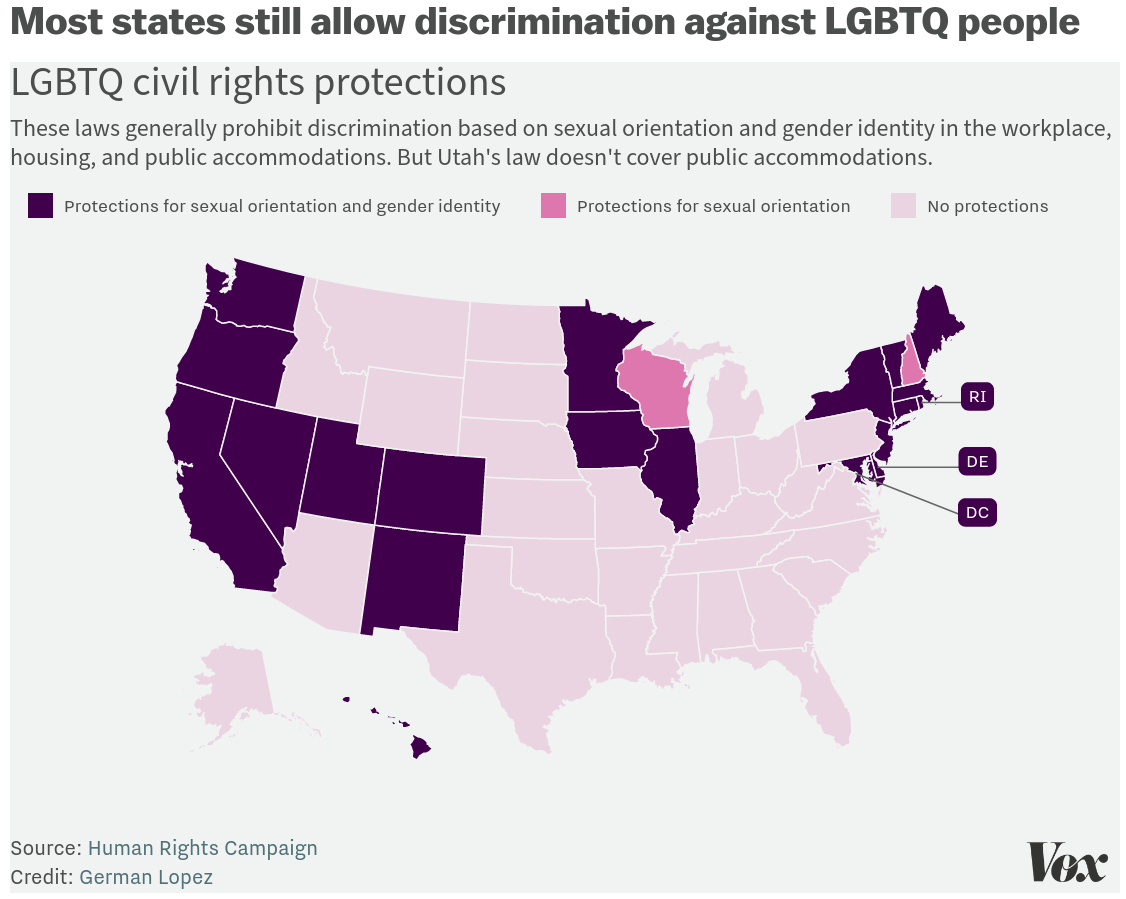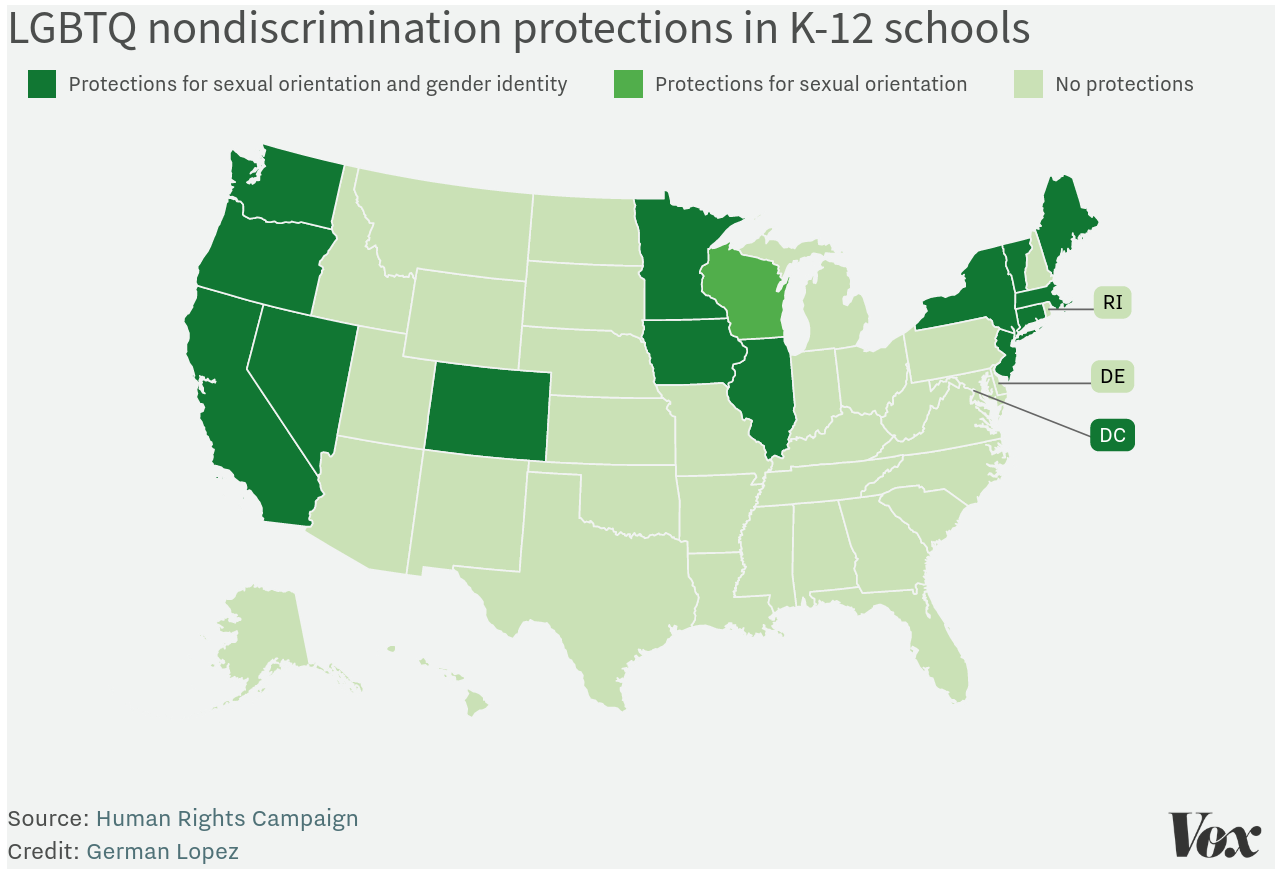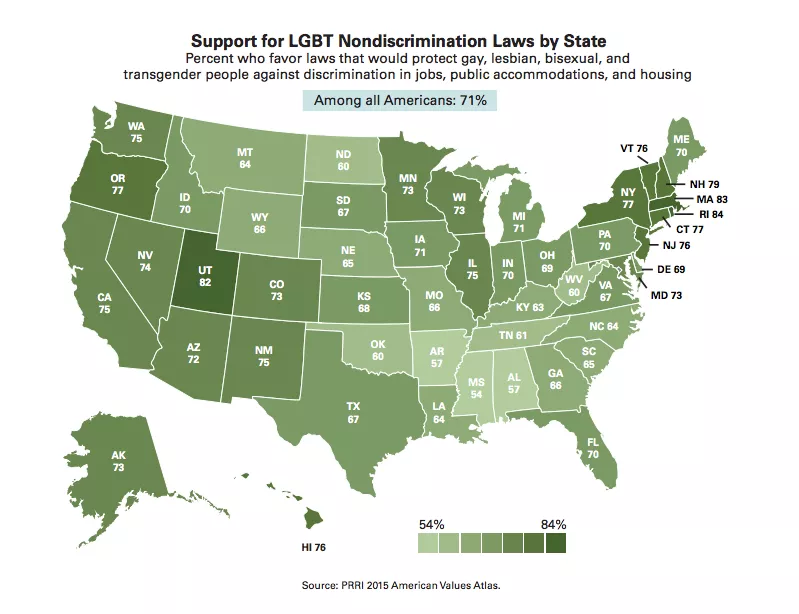"So many people had these false ideas of gay men as single sexual predators who were dangerous -- really similar to the ways many people think of trans people."
[2016-06-03] Transgender bathroom bills technically force men into women's bathrooms. How ironic. The unintended consequence of bathroom bills that lawmakers don't want you to think about. Transgender Americans are in the midst of a public health crisis. The homicide rate for trans people hit a historic high last year, and roughly 41 percent of trans people have tried to kill themselves. But what are lawmakers in North Carolina upset about?
[Source]
Bathrooms have become a huge political battleground in America.
On Wednesday [2017-02-22], the Trump administration took its first major anti-LGBTQ policy action -- by rescinding a guidance that protected transgender students from discrimination in federally funded schools and, most controversially, asked schools to let trans students use the bathrooms and locker rooms that correspond with their gender identity. It was the bathroom portion that made the guidance so controversial among conservative lawmakers, inspiring states to file lawsuits against the Obama administration and, eventually, leading the Trump administration to rescind the guidelines.
This wasn't the first time debates over bathrooms got in the way of trans rights. Last year, for example, a national firestorm erupted after North Carolina passed an anti-LGBTQ law in part prohibiting trans people from using the bathroom for their gender identity in schools and government buildings. Businesses and artists have protested and boycotted the state. Multiple lawsuits were filed, including by the Obama administration.
How did the US get to a point where bathrooms are at the center of the country's culture wars?
The current bathroom battle did not start in North Carolina or the Trump administration. While the bathroom issue has popped up in small fights over the years, the current debate really goes back to Houston, Texas, the first place where it was proven to be a serious issue for LGBTQ rights. And it's not solely about bathrooms; although the debate has largely gone to the toilet, it is actually about a much bigger struggle to expand rights for LGBTQ people.
The fight is really about the next phase of the LGBTQ movement
[2015-09-15] The new frontier of LGBTQ civil rights, explained. The Supreme Court expanded marriage equality across the US. But that doesn't mean LGBTQ people have equal rights yet.
[Source]
The current bathroom battle began in a little-known electoral contest in 2015, in Houston.
There, the city council in 2014 passed the Houston Equal Rights Ordinance (HERO), which would have prohibited discrimination in the workplace, housing, and public accommodations (restaurants, hotels, and other places that serve the public) against people based on a variety of traits, particularly sexual orientation and gender identity. The local ordinance was meant to fill a gap in Texas's -- and most states' -- laws: LGBTQ people aren't currently included in most state and federal nondiscrimination statutes.
But conservative opponents, who argue that businesses should be able to discriminate against LGBTQ people who violate their religious values, managed to get a referendum on HERO on the November 2015 ballot after lengthy legal battles.
The referendum against HERO, at first, seemed to have no chance of success. Polls consistently found HERO surviving the challenge, such as one survey taken weeks before the election that found HERO had plurality support -- 45 percent of adults in Houston would vote for it, 36 percent against, and 20 percent were unsure.
Then conservatives began scaring people about bathrooms. They argued that HERO would let trans people use the bathroom that corresponds with their gender identity. Once that happens, they said, men will disguise themselves as trans women to sneak into women's bathrooms and sexually assault women. (This has never happened as a result of states' nondiscrimination laws. More on that later.)
The tactic worked: In November, voters rejected HERO, which once looked like a winner in the polls. Conservatives managed to turn public opinion to oppose an LGBTQ nondiscrimination law by scaring people about bathrooms.
Religious and social conservatives celebrated the win. Finally, after losing fights over Don't Ask, Don't Tell and same-sex marriage for years, this was a talking point that seemed to actually push back against the expansion of LGBTQ rights.
So when Charlotte, North Carolina, passed a nondiscrimination law that sought to ban discrimination against LGBTQ people in public accommodations, North Carolina Republicans immediately turned to bathrooms to repeal the measure.
Then-Gov. Pat McCrory warned, "This shift in policy could also create major public safety issues by putting citizens in possible danger from deviant actions by individuals taking improper advantage of a bad policy. Also, this action of allowing a person with male anatomy, for example, to use a female restroom or locker room will most likely cause immediate State legislative intervention which I would support as governor."
Republicans in the state legislature got on board. On March 23, 2016, the legislature introduced, it passed, and McCrory signed into law a measure that bans all local nondiscrimination ordinances that include sexual orientation and gender identity, and effectively prohibits trans people from using the bathroom and locker rooms for their gender identity in schools and public buildings.1
The legislature, in other words, managed to use fears about trans people in bathrooms as a cudgel to successfully repeal laws that protected LGBTQ people from discrimination.
Since then, North Carolina's law has become a national controversy, with businesses, celebrities, and politicians chiming in on both sides. Many spoke out against the law, but some places considered their own anti-LGBTQ and anti-transgender measures. As the New York Times noted, at times it seems like the nation is in the middle of a "bathroom hysteria."
There's just one problem: The basis for concerns about trans people in bathrooms is a myth.
The debate over bathrooms is based on a myth
[2016-04-12] Here's The Truth About The Anti-LGBT "Bathroom Predator" Myth. Conservatives are using bogus scare tactics about "bathroom predators" to pass creepy, invasive laws regulating transgender people's bathroom access. And uncritical media coverage is helping them do it.
[Source]
Supporters of anti-trans laws like North Carolina's claim that letting trans people use the bathroom or locker room for their gender identity will allow men to disguise themselves as trans women to go into women's bathrooms or locker rooms and sexually assault and harass women.
But even if trans people are allowed to use the bathroom or locker room that aligns with their gender identity, sexual assault remains illegal.
Moreover, there's no evidence that nondiscrimination laws -- and other policies that also let trans people use the bathroom for their gender identity -- lead to sexual assault in bathrooms and locker rooms. In two investigations, Media Matters confirmed with experts and officials in 12 states and 17 school districts with protections for trans people that they had no increases in sex crimes after they enacted their policies.
-
[Image source. Click image to open in new window.]
Conservatives usually counter that there are examples of men sneaking into women's bathrooms to attack women. But as PolitiFact reported, none of the examples cited in the US happened after a city or state passed a nondiscrimination law or otherwise let trans people use the bathroom or locker room for their gender identity. Instead, these seem to be examples of men doing awful things regardless of the law -- which has, unfortunately, happened since the beginning of civilization.
One example is a case in Toronto, Canada, which now has a nondiscrimination law, in which a man disguised himself as a woman and attacked women in shelters. But the attacks happened months before Ontario (Toronto's province) protected trans people in a nondiscrimination law. So the law couldn't have been the cause.
While the issue is now being used primarily against trans people, historically bathroom fears have been regularly deployed against civil rights causes. It was used against black people to justify segregation -- by invoking fears that black men would attack white women in bathrooms. And it was used to stop the Equal Rights Amendment, which tried to establish legal equality between men and women, because opponents claimed it would lead to the abolition of bathrooms for different genders, potentially putting women in danger.
Beyond this myth, some people are also, frankly, just bothered by the idea that someone in the same bathroom or locker room won't share the same genitalia as them. But a lot of things happen in these facilities that people aren't comfortable with -- and people have historically managed to deal with it to accommodate others' rights and needs.
So if it's not harming anyone, it's best, LGBTQ advocates argue, to let trans people use the facility for their gender identity without making them feel ostracized and discriminated against. (Discrimination is a big contributor to gender dysphoria, a medical condition among some trans people that can cause depression, anxiety, and even suicidal ideation.)
The privacy concern gets to the root of much of this issue: Bathrooms are places where really private things happen, even if they are accessible to the public, and that makes people feel vulnerable. "People are afraid because they're exposed," Kathryn Anthony, author of Designing for Diversity: Gender, Race and Ethnicity in the Architectural Profession, told the Guardian. "There's a vulnerability we feel in public restrooms we don't feel in other places."
Conservatives have latched on to this insecurity to propagate myths about the power of discriminatory laws to stop horrible attacks in bathrooms and protect people's privacy. And even though these are plainly myths with no evidence behind them, they have worked to sustain discrimination, from Jim Crow policies to North Carolina's anti-LGBTQ law.
Anti-transgender bathroom laws are bad for transgender people -- but also for business
[2015-04-23] Life as a transgender woman.Here's what it's like to transition when you're not a celebrity like Caitlyn Jenner. For much more on living as a transgender person in America, read the full feature.
[Source]
Obviously, the foremost victims of anti-transgender bathroom laws are trans people. Forcing trans people to use the bathroom that doesn't align with their gender identity acts as a reminder that, as far as society has come on some LGBTQ issues, it's still not completely willing to accept trans people and their identities -- even if trans people pose no danger to anyone else.
Under these measures, trans people also have to constantly fear using the bathroom that corresponds with their gender identity. As Lily Carollo wrote for Vox, "From now until the law is repealed or settled in court, or until my birth certificate is amended, I will keep breaking the law. I'm not the only one. I will be an anxious mess every time I use the bathroom, but I don't see any option. It's all I can do, really. I am a woman."
Gavin Grimm, a 17-year-old trans activist who sued his school for bathroom access, framed it another way: "This wasn't just about bathrooms. It was about the right to exist in public spaces for trans people," Grimm told me, quoting trans actress Laverne Cox. "Without the access to appropriate bathrooms, there's so much that you're limited in doing. If you try to imagine what your day would be like if you had absolutely no restrooms to use other than the home, it would take planning. You would probably find yourself avoiding liquids, probably avoiding eating, maybe going out in public for too long at a time."
But these measures have also proven to be bad in another way: They cost jobs.
After North Carolina passed its law, PayPal and Deutsche Bank pulled expansions into the state that would have created hundreds of jobs. Several musicians, such as Bruce Springsteen and Pearl Jam, canceled concerts in the state. A+E Networks and 21st Century Fox said they would reconsider using North Carolina as a filming location in the future. And more than 200 business leaders signed a letter asking Gov. McCrory to repeal the law.
By Wired's estimate, North Carolina has so far lost $395 million -- "more than the GDP of Micronesia" -- as a result of the law.
Businesses have a financial incentive to act this way: A major goal of theirs is to attract new talent. But young hires are also more likely to be more accepting of LGBTQ issues, including trans people in bathrooms, and some of them may be LGBTQ themselves. So appearing supportive of LGBTQ rights can be one way that a company shows it shares the values of the up-and-coming workforce.
Whatever the reason, businesses' resistance to anti-LGBTQ laws is enough to make any lawmaker reconsider whether to pass these bathroom measures.
"Whether you're a Democratic governor or a Republican governor, virtually without exception, goal No. 1 is to keep jobs in your state and to attract new jobs that you don't currently have," Chad Griffin, president of the LGBTQ rights group Human Rights Campaign (HRC), previously told me. "That is one thing that is shared between conservative governors, liberal governors, moderate governors."
Most states still allow discrimination against LGBTQ people
-
[Image source. Click image to open in new window.]
So why do conservatives tap into these bathroom myths, risking a huge backlash as North Carolina has? They are essentially trying to stop the spread of LGBTQ rights. Specifically, they are trying to sustain a reality in which employers, landlords, businesses, and schools can discriminate against LGBTQ people without legal consequences.
Most states don't ban discrimination based on sexual orientation and gender identity in any of these settings.
So under most states' laws, an employer can legally fire someone because he's gay, a landlord can legally evict someone because she's lesbian, and a hotel manager can legally deny service to someone who's transgender -- for no reason other than the person's sexual orientation or gender identity.
Currently, 20 states ban at least some forms of discrimination based on sexual orientation and gender identity, while two additional states ban discrimination based on sexual orientation. Some other states protect public but not private employees from discrimination. Many municipalities have nondiscrimination laws that only apply within their local borders, even in states that don't have such laws. And some companies prohibit discrimination in their own policies.
The protections vary from state to state. Utah's protections for sexual orientation and gender identity don't apply to public accommodations. Some states also include exemptions for discrimination based on religious grounds. Enforcement varies, as well: Depending on the state, private lawsuits, fines, and jail time are all possible forms of punishment for discrimination.
-
[Image source. Click image to open in new window.]
The same is true in schools: Most states don't have civil rights laws that protect LGBTQ people from discrimination in education. Fourteen states have education laws that ban discrimination based on sexual orientation and gender identity, while Wisconsin protects students from discrimination based on sexual orientation but not gender identity. So in a majority of states, LGBTQ students have no explicit legal protections in schools.
At the same time, Americans strongly support nondiscrimination laws for LGBTQ people. In a 2015 survey by the Public Religion Research Institute, majorities in every single state said they want protections for LGBTQ people in the workplace, housing, and public accommodations.
-
[Image source. Click image to open in new window.]
But as Houston demonstrated, conservatives can turn public opinion by invoking fears of bathrooms. So that's exactly what they've tried to do in the past several months -- by making LGBTQ rights battles predominantly about trans people in bathrooms and locker rooms.
Even if states don't pass laws protecting LGBTQ people, or even if they pass laws that allow discrimination, there may be a way to bypass these measures: federal law. Under federal civil rights laws, sex discrimination is banned in the workplace, housing, and education (but not public accommodations). LGBTQ rights advocates argue that since anti-LGBTQ discrimination is fundamentally about sex-based expectations, anti-LGBTQ discrimination is prohibited under bans against sex discrimination.
The Obama administration said it believed federal law does protect at least trans people. That's why it filed its guidance for schools: It argued that trans people are protected under federal civil rights laws, particularly Title IX, and therefore discrimination against trans students is illegal.
The Trump administration, however, has argued that this interpretation of federal civil rights laws is an example of federal overreach, that these issues should be left to the states to decide, and that federal civil rights laws don't fully protect trans people because, in the administration's view, that's not what the laws' authors in the 1960s and '70s intended.
The courts will likely have the final word over whether federal civil rights laws really do protect LGBTQ people. (There is a case in front of the Supreme Court that deals with the bathroom issue and federal civil rights laws.) But for the time being, bathrooms are part of a political and legal debate.
For LGBTQ groups, the strategy will focus on humanization and lobbying businesses
[2016-04-28] Transgender Man and His Colleagues in North Carolina Speak Out Against Absurd Consequences of HB2.
[Source]
In this new ad, Zeke Christopoulos -- a transgender man who lives in Asheville, North Carolina -- and two of his professional colleagues discuss their concerns about the discriminatory House Bill 2, which knocked down existing non-discrimination protections for LGBT people and banned transgender people from using public restrooms. One of Zeke's co-workers, Patricia Hickling Beckman, shares her initial reactions to learning Zeke transitioned from female to male, and Zeke explains the absurd possibility of what could happen to him under HB 2 when a transgender man like himself uses a public bathroom.
This video is a joint product of the American Unity Fund, Freedom for All Americans and Equality North Carolina, state and national organizations working toward comprehensive non-discrimination protections for LGBT people in North Carolina and nationwide.
For LGBTQ advocates, the goal isn't just to wait until courts decide in their favor. After the losses in Houston and North Carolina, they have gone back to the drawing board to try to devise a way not just to stop the spread of anti-trans bathroom policies but also to get more cities and states to pass nondiscrimination protections for LGBTQ people.
Based on my conversations with advocates, their push will rely on three parts.
First, just as same-sex couples were humanized in the same-sex marriage battle, trans people must be humanized to show the world that they are not deviant -- as the link to attacks in bathrooms can suggest.
"Around the marriage issue, so many people had these false ideas of gay men as single sexual predators who were dangerous -- really similar to the ways many people think of trans people," Janson Wu, executive director of the LGBTQ group GLAD, said. "But once we were able to show that they are brothers, sisters, parents, children, and that they work in the community and volunteer in their churches and community groups, and put them in the context of their lives, it was really critical to advancing the equal humanity and dignity of all people, particularly LGBTQ people."
That's why LGBTQ groups like Freedom for All Americans are now running ads in North Carolina that put a face on trans people. "This is clearly a piece that has been missing," Matt McTighe, the executive director of Freedom for All Americans, told BuzzFeed. "We need to humanize this issue, and to educate people on who transgender people really are."
Second, advocates want to rally business leaders against anti-LGBTQ laws to show that such measures can have major economic consequences. "[T]he increase in business [engagement and lobbying against these laws] has been key to our success," Griffin of HRC told me, "and I think it will be key to our success as we engage in these battles in the future."
The successes he's speaking about came in Indiana and Georgia. In Indiana, legislators amended a religious freedom law to clarify that it doesn't allow discrimination against LGBTQ people after a massive backlash in 2015. In Georgia, Gov. Nathan Deal in 2016 vetoed a religious freedom law that advocates said allowed anti-LGBTQ discrimination after businesses, particularly Hollywood studios that film in Georgia, threatened to boycott the state.
Finally, advocates plan to continue pointing out that there is no evidence that men take advantage of trans-friendly policies to attack women in bathrooms and locker rooms.
Combined, LGBTQ groups hope they can show voters and lawmakers that fears about bathrooms are hurting real people, cost the state jobs, and are wholly based on myths.
This is a big shift from recent years, when LGBTQ advocates tended to avoid the issue of bathrooms, because they saw it as a loser for them. But Houston and North Carolina have shown that bathrooms are the next battleground for LGBTQ rights -- so activists can no longer ignore them.
Return to Persagen.com



